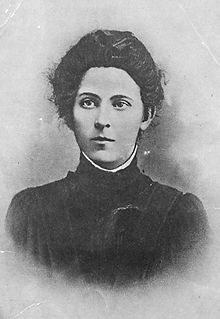- Maria Spiridonova
-
Maria Spiridonova 
Born October 16, 1884
Tambov, RussiaDied September 11, 1941 (aged 56)
Oryol, RussiaMaria Alexandrovna Spiridonova (Russian: Мария Александровна Спиридонова; October 16, 1884, Tambov – September 11, 1941, Medvedevsky Forest near Oryol) was a figure in Russian revolutionary circles at the beginning of the 20th century.
Biography
She joined the Socialist-Revolutionary Party during her training to become a nurse. In January, 1906, Spiridonova assassinated Police Inspector General G.N. Luzhenovsky who had ordered the brutal police suppression of a peasant uprising during Russian Revolution of 1905. She shot General Luzhenovsky in the face with a revolver at the provincial railway station of Borisoglebsk. Following the assassination, and after her arrest, she was subjected to horrendous physical and sexual abuse at the hands of soldiers. Some of the outrages committed against her included being dragged face down on cobbled steps, stripped and whipped, having cigarettes stubbed out on her breasts and further beating.
Sections of Russian society aired their indignation at her cruel treatment, and with the help of admiring popular support, she was spared the death sentence and instead was sent to prison in exile.
She was convicted for the assassination and exiled to Siberia. She was kept in the Maltzevskaya prison, where was severely caned with birches (розги) on bare as disciplinary corporal punishment,[1] fully undressed corporal punishment was not usual for political prisoners at that time. Following the February Revolution of 1917 Spiridinova was released from custody in an amnesty and had her followers use dynamite to destroy the prison she had been kept in - the Chuti prison. This was something she wanted to have repeated upon the Peter and Paul Fortress in Petrograd, but her wishes for this came to no avail.
Spiridonova later became the de facto leader of the Left Socialist-Revolutionary Party in 1917. The LSR opposed the Treaty of Brest-Litovsk and broke with the Bolsheviks over this issue, as well as being critical in regard to Bolshevik views on the future of peasant ownership and use of land in the rural areas. They organized an unsuccessful insurrection against the Bolsheviks in July 1918, the insurrectionists failing in their fighting against pro-Bolshevik soldiers of the Red Latvian Riflemen, and were contained in the Kitai-gorod district of Moscow. After that, Spiridonova was arrested twice and imprisoned for a length of time. According to Emma Goldman, the anarchist, who secretly met Spiridonova in July 1920, she was also tortured by being taken out at night and informed that she was to be shot on a spot - a favored method of the Cheka at that time. Louise Bryant, the feminist writer and wife of John Reed, met her as well. During Stalin's purges, she was arrested with twelve other Left Socialist-Revolutionaries, in Ufa, where they had been living in exile. Accused of plotting a peasant uprising, she was sentenced to twenty-five years in prison by a Military Collegium on March 8, 1937. After a hunger strike she was held in isolation at Orel prison.
Along with over 150 other political prisoners (among them Christian Rakovsky and Olga Kameneva), Maria Spiridonova was executed outside Oryol on September 11, 1941, shortly after the German invasion of the Soviet Union.[2] This execution was one of the many NKVD massacres of prisoners committed in 1941.
References
- ^ Школьник, Мария ЖИЗНЬ БЫВШЕЙ ТЕРРОРИСТКИ, ГЛАВА VI
- ^ Alexander Rabinowitch, Maria Spiridonova's "Last Testament", Russian Review, Vol. 54, No. 3 (Jul., 1995), pp. 424-446
External links
Categories:- 1884 births
- 1941 deaths
- Deaths by firearm in Russia
- People executed by the Soviet Union
- Executed Soviet people
- Executed Russian women
- Left socialist-revolutionaries
- Russian Constituent Assembly members
- Russian female murderers
- Russian assassins
- Russian people convicted of murder
- Great Purge victims
Wikimedia Foundation. 2010.
